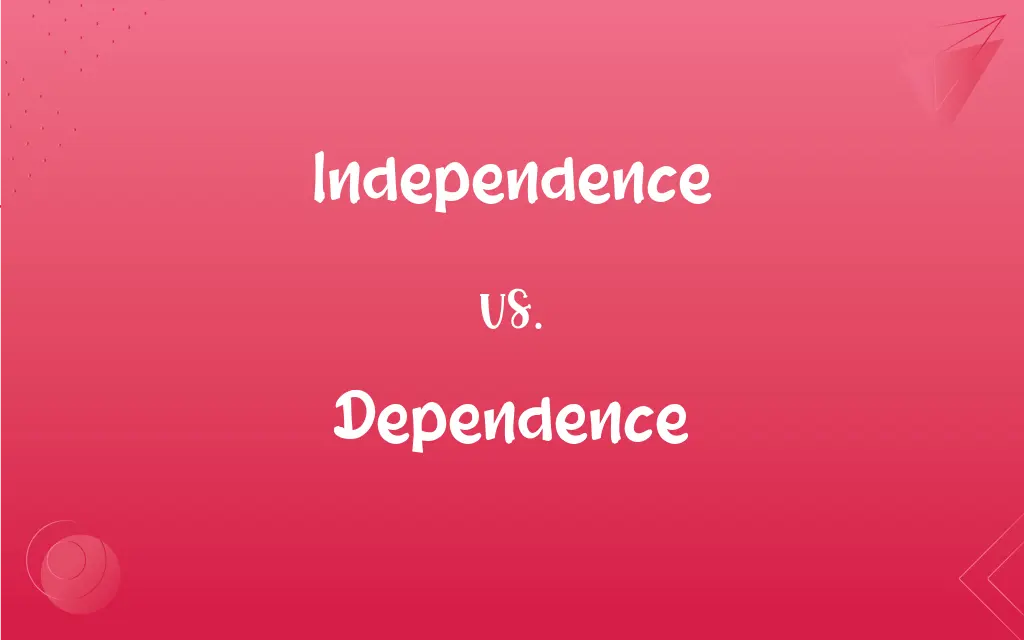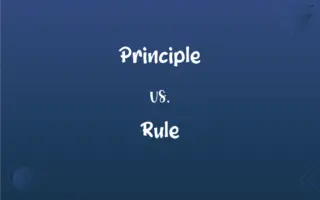Independence vs. Dependence: What's the Difference?
Edited by Aimie Carlson || By Janet White || Updated on November 10, 2023
Independence is the state of being self-sufficient and not reliant on others, whereas dependence refers to the condition of relying on or needing support from something or someone.

Key Differences
Independence is characterized by self-sufficiency and autonomy, often reflecting the ability to make decisions and act without external support. Dependence, conversely, implies a need for support, assistance, or guidance from others or external factors.
In personal development, independence signifies the capability to manage one's affairs and make independent choices. Dependence in this context can mean relying on others for emotional, financial, or physical support.
Politically, independence denotes a nation or state's sovereignty and self-governance, free from external control. Dependence in international relations may refer to a country's reliance on another for economic, military, or political support.
Independence is often a goal in various contexts, symbolizing strength, self-reliance, and freedom. Dependence, however, can sometimes indicate vulnerability or a lack of self-sufficiency, requiring aid or intervention.
In relationships, independence is maintaining individuality and self-identity, while dependence often involves a significant reliance on a partner for emotional or decision-making support.
ADVERTISEMENT
Comparison Chart
Definition
State of being self-sufficient, autonomous
Condition of relying on support from others
Personal Development
Capability to manage own affairs independently
Reliance on others for support
Political Context
Sovereignty and self-governance of a nation
Economic, military, or political reliance
Symbolism
Strength, self-reliance, freedom
Vulnerability, lack of self-sufficiency
Relationships
Maintaining individuality and self-identity
Significant reliance on a partner
ADVERTISEMENT
Independence and Dependence Definitions
Independence
Self-sufficiency and autonomy.
She values her independence and makes her own decisions.
Dependence
Relying on someone or something for support.
His dependence on his family was evident.
Independence
Ability to live and decide independently.
Financial independence is important to him.
Dependence
State of being influenced or controlled by others.
The country's dependence on imported oil was a concern.
Independence
Freedom from external control or influence.
The country celebrated its independence.
Dependence
Need for assistance or guidance from others.
There was a growing dependence on technology.
Independence
Self-reliance and self-government.
The movement fought for political independence.
Dependence
Requiring help or support from something external.
Their economic dependence on tourism affected the region.
Independence
State of not being influenced by others.
Her independence in thinking led to innovative ideas.
Dependence
Lack of self-sufficiency.
The patient's dependence on medication increased.
Independence
The state or quality of being independent.
Dependence
The state of being determined, influenced, or controlled by something else
The economy's dependence on oil.
Independence
(Archaic) Sufficient income for comfortable self-support; a competence.
Dependence
The state of being dependent on another for financial support.
Dependence
The condition of being dependent on a substance such as a drug or on a given behavior
Alcohol dependence.
Gambling dependence.
Dependence
(Archaic) Trust; reliance.
FAQs
How does dependence manifest in personal relationships?
Dependence in relationships involves heavily relying on a partner for emotional support.
How is independence valued in society?
Independence is often valued as a sign of maturity and self-reliance.
What exemplifies independence?
Managing life without relying on external support exemplifies independence.
Is dependence always negative?
Not always; it can be a normal part of interdependent relationships.
What role does independence play in national contexts?
In national contexts, independence signifies a country's self-governance.
Is emotional dependence common?
Emotional dependence is common, especially in close relationships.
Can independence be financial?
Yes, financial independence means managing finances autonomously.
Can dependence be on substances?
Yes, substance dependence is reliance on drugs or alcohol.
Is independence a goal in upbringing?
Yes, fostering independence is often a goal in child upbringing.
Can dependence be on technology?
Yes, there can be a heavy dependence on technology in modern life.
Does dependence mean lack of strength?
Not necessarily; it can sometimes mean a healthy reliance on others.
Does independence increase with age?
Typically, independence increases with age and maturity.
Can independence lead to isolation?
Excessive independence might lead to social isolation in some cases.
Does dependence affect decision-making?
Dependence can impact decision-making, often relying on others' input.
Is dependence always on people?
No, it can also be on systems, substances, or technology.
How does dependence manifest in addiction?
Dependence in addiction involves a compulsive need for a substance.
Can a nation's independence be symbolic?
Yes, a nation's independence often symbolizes freedom and autonomy.
Is independence important in careers?
Independence can be crucial for success and satisfaction in careers.
Can independence be collective, like in movements?
Yes, independence can be a collective goal in social or political movements.
Can dependence change over time?
Dependence levels can change due to circumstances or personal growth.
About Author
Written by
Janet WhiteJanet White has been an esteemed writer and blogger for Difference Wiki. Holding a Master's degree in Science and Medical Journalism from the prestigious Boston University, she has consistently demonstrated her expertise and passion for her field. When she's not immersed in her work, Janet relishes her time exercising, delving into a good book, and cherishing moments with friends and family.
Edited by
Aimie CarlsonAimie Carlson, holding a master's degree in English literature, is a fervent English language enthusiast. She lends her writing talents to Difference Wiki, a prominent website that specializes in comparisons, offering readers insightful analyses that both captivate and inform.































































